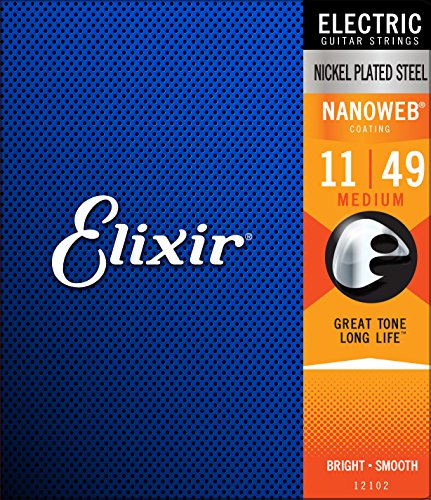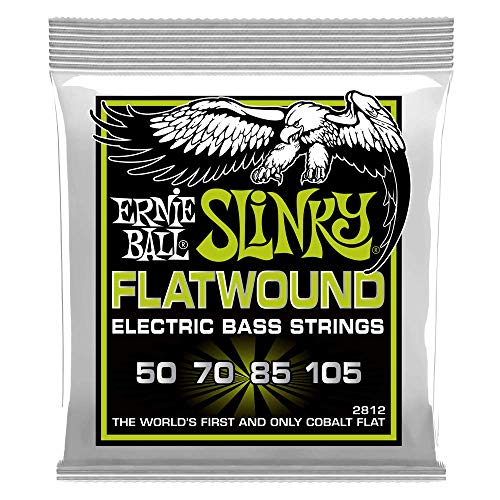Flatwound and roundwound strings are two of the most popular types of guitar strings. Each one has its own sonic qualities and it is sometimes hard to pick between the two. Simply put, flatwounds are wound with completely flat material and roundwounds are wound clockwise. The latter is the most popular type of string.
While roundwounds are widely used for a variety of genres such as pop and rock, flatwounds are favored by jazz guitarists due to their smooth characteristic. It is also very popular with bassists. Not only because of the tone: the playability with flatwounds is also improved.
In this article, we’re gonna go through the main differences and similarities between flatwound vs roundwound guitar strings, as well as help you decide which one is the best for you.
Related: Best Acoustic Guitar Strings
Table of Contents
- What’s the Difference between Flatwound and Roundwound?
- Which One Is Right for You?
- Are Flatwound Guitar Strings Right for You?
- What Considerations Should You Make When Switching from Roundwound to Flatwound Strings?
- Should I Use Flatwound Bass Strings in my Bass?
- Best Roundwound Strings
- Best Flatwound Strings
- Summing It Up – Differences Between Flatwound and Roundwound Strings
- Frequently Asked Questions
What’s the Difference between Flatwound and Roundwound?
Flatwound strings, unlike roundwound strings, are wound with a material that has a completely flat surface. This flat surface is what gives the flatwound strings their name. Flatwound strings are often used for slide guitars because of this characteristic, which helps give a better grip to the string in order to maintain a smoother slide and sound.
The flatwound strings are popular with bass guitar players because they have less string noise and help you achieve a smoother slide.
Roundwound strings, on the other hand, are the most popular type of guitar strings. They have a wrap wire that is wound clockwise over a steel core, that’s the reason for their name. These strings sound good and have great sound projection, with a balanced response across the full spectrum, but tend to cause more finger noises than flatwound strings.
Which One Is Right for You?
It depends on a lot of things, such as your playing style and your preferences over tone.
Flatwounds are usually thinner than roundwounds and produce a warmer tone. For this reason they are often used by soloists and jazz players who need more clarity in their playing and those who like smoother slides.
Roundwounds produce more sustain and a brighter sound which makes them ideal for rock, metal, and country: genres that require a lot of weight and projection from the strings. Additionally, they have less tension on the neck which allows for greater comfort when playing long sets at concerts or practicing.
Both types can be used for pretty much anything, so it is a matter of trying and testing which one fits your playing the best.
Are Flatwound Guitar Strings Right for You?
If you are looking for a warmer tone, a very bright sound, or a smooth feel when playing in the upper register, then flatwounds are right for you. If you want to produce more sustain and want to play with heavier gauge strings, then roundwounds are the way to go. You can also try experimenting with both types of strings and see which one fits your style better.
What Considerations Should You Make When Switching from Roundwound to Flatwound Strings?
The first thing you should consider is your playing style and your music genre. What genre are you playing? If it is rock or pop, then flatwounds may not be the best choice.
If you’re playing jazz, bossa nova, or any style that requires your playing to be smoother, then flatwound strings are a great choice.
As roundwound strings usually have more tension than flatwound ones, you must take your guitar to a luthier for it to be properly adjusted to the strings you’re using on your instrument. This is especially true if the set of strings you’re buying has a different gauge than the ones that were on your guitar originally.
Also Read: Best Guitar Strings For Metal & Coated Vs Uncoated Guitar Strings
Should I Use Flatwound Bass Strings in my Bass?
It depends. If you’re after a smoother and warm sound with easier playability, then you should consider flatwound string sets for your bass. These are popular among bass players for a reason: they tend to sound very nice in any bass model and provide a full and rounded bottom-end. They don’t have the same mid and highs definition of roundwounds, though.
For that matter, if you’re playing a very aggressive style such as rock and metal where you need lots of mid-range to cut through the mix and you’re frequently using distortion, then maybe roundwound is the way to go. The choice is highly personal, however. Trying it in real life is the only way to be sure.
Best Roundwound Strings
Ernie Ball Regular Slinky
The Ernie Ball Regular Slinky set is our top pick for roundwound strings. These are great for a variety of styles, and they produce a bright and percussive sound. They’re also very durable, and they offer more sustain than other brands of roundwound string sets. Definitely a great choice for beginners to intermediate to advanced players.
Features
- Bright, Balanced Tone
- Element Shield Packaging
- Made in California, USA
- Available in Different Gauges
– – –
Elixir Strings Electric Guitar Strings
Elixir strings are coated with NANOWEB, which makes them one of the most durable strings on the market. These roundwound strings have a bright and smooth tone as well.
Features
- Coated with Nanoweb Technology
- More Durable than Most Other Strings
- Bright and Smooth Sound
- Available in Different Gauges
– – –
Best Flatwound Strings
D’Addario Guitar Strings Set
An excellent choice for those who play styles such as jazz and bossa nova, due to the smooth tone of this flatwound string set.
Features
- Round, Full Low End without Losing Punch
- Smooth Playability
- Extended Durability
- Available in Different Gauges
– – –
Ernie Ball Flatwound Regular Slinky Bass Strings
These strings are flatwound made for bass. The biggest benefit of using flatwound strings on your bass is the smoother slide you get across the frets.
Features
- Smooth Feel of Traditional Flats with the Power of Cobalt
- Cobalt Alloy Wrap Wire Delivers Added Clarity and Output
- Less Finger Noise and Squeaking
- Available in Different Gauges
– – –
Summing It Up – Differences Between Roundwound and Flatwound Strings
Roundwound Strings
- Usually, a steel core wound with nickel in a clockwise motion.
- Most common type of strings.
- Bright tone with high output.
- Better response in the mid-range.
- More finger noise and squeaking.
Flatwound Strings
- Steel core wound with a completely flat material.
- Best strings for genres such as jazz and bossa nova, where you need a warm and balanced sound that isn’t too harsh.
- More presence in the lows and low-mids.
- Smooth playability.
- Less finger noise and squeaking.
Frequently Asked Questions
What Is the Advantage of Flatwound Guitar Strings?
The main advantage of flatwounds is that they produce a brighter tone and are much more stable in the upper register. Other than that, flatwound strings give you much smoother slides and bends and reduce greatly the occurrence of string noises and squeaks: that’s why many bass guitar strings are usually flatwound.
Why Are Flatwound Strings More Expensive?
Flatwound strings are a bit more expensive than roundwound ones since they’re not as popular and fewer people use them.
Do Flatwound Strings Have Easier Playability?
Flatwound strings usually have lower tension and will be easier to play on your guitar. This will largely depend on the gauge of the strings, however. Generally, lighter strings are easier to play than those with a heavier guitar string gauge, since they have less tension and are more forgiving to your fingertips.
Are Flatwound Strings Good for Metal?
Yes, flatwounds are generally more stable and have a brighter tone. They’re also less prone to noise, so they may suit metal players better than roundwounds, but that is highly personal.
Verdict
As you can see, the difference between roundwound and flatwound strings is simple. Roundwound strings have a round wound around them that goes clockwise and are the most popular type. Flatwound strings, on the other hand, are wound with a completely flat material which improves playability and tone.
Whichever is your choice, there is no fast rule. Roundwound strings are usually used in rock and pop music while flatwounds are the best for jazz and bossa nova. Some bassists prefer the flatwound strings too because of the smoother slide they can get with this type of string. It is, therefore, an extremely subjective pick.
If you’re swapping roundwounds for flatwounds, remember to take your guitar to a luthier to have it properly adjusted, so you mantain a stable sound and avoid damaging your instrument.We hope you liked this article. Make sure to also check our related posts for guitarists. If you have any questions, feel free to hit us up!








